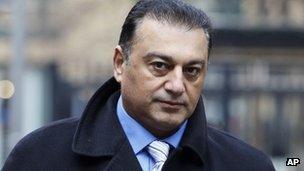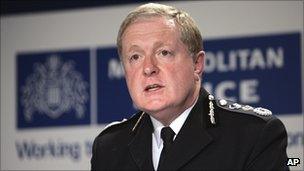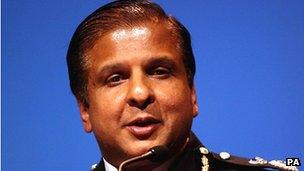Profile: Ali Dizaei
- Published

Ali Dizaei was born in Iran and joined Thames Valley Police in 1986
Former Commander Ali Dizaei has been both a rising star and a thorn in the side of the Metropolitan Police.
Flamboyant and outspoken, he has climbed the ranks while having the suspicions of the force repeatedly directed towards him.
In turn, he has thrown the spotlight back on his own senior colleagues, consistently criticising them for presiding over - and even encouraging - racism within the Met.
Now he has been jailed for three years after being found guilty of misconduct in a public office and perverting the course of justice following a retrial.
The charges relate to an incident in July 2008 outside a west London restaurant when a row broke out after Waad Al-Baghdadi demanded money from Mr Dizaei for work done on his personal website.
He accused Dizaei of then assaulting and falsely arresting him.
During the first trial, Dizaei likened the allegations to something from "an episode of Life on Mars or the Sweeney".
The jury found him guilty of misconduct in a public office and perverting the course of justice and he was sentenced to four years imprisonment in February 2010.
But he secured a retrial after the Court of Appeal ruled in May the conviction could not "be regarded as safe" after fresh evidence cast doubt on Mr Al-Baghdadi's credibility as a witness.
Tipped for success
In September, the Police Appeals Tribunal ruled Dizaei, who was sacked from the Met after being jailed, should be reinstated.
But the Metropolitan Police Authority (MPA) suspended him on full pay until after the retrial, which began last month. Dizaei had then said he would appeal against the MPA's decision.
Other charges of misusing a corporate credit card were dropped last November after an inquiry found no evidence of wrongdoing.
It is not the first time such controversy has come his way.
Born in Iran in 1962, Dizaei is the grandson of a police assistant commissioner.
His father wanted him to have a British education, so he sent him to boarding school in West Sussex and he then went on to study law at London's City University.
His police career began in genteel Henley-upon-Thames in 1986.
From the start, he was tipped for the top, and alongside his job, he managed to find time to study for an MA and then a doctorate.
Once a chief inspector, he was made an adviser to the home secretary on race issues, before being transferred to the Met - and promoted to superintendent - in 1999.
Fatefully, perhaps, it was the year in which the force was accused of institutional racism after the murder of Stephen Lawrence.
Once at the Met, Dizaei quickly showed his willingness to speak out, accusing the force of "ethnic cleansing" by using "culturally-biased" tests to pick white officers for senior ranks.
But he was also secretly suspected of wrongdoing himself.

Dizaei repeatedly criticised former Met chief Sir Ian Blair
In 2000, he became the target of Operation Helios - which was to turn into the most expensive inquiry ever held into a single officer.
At an eventual cost of £2.2m, Dizaei's own colleagues investigated him over allegations of perverting the course of justice, misconduct in public office and making false expense claims.
He was suspended from duty for two years and in 2003 stood trial at the Old Bailey. He was eventually cleared of all charges.
Speaking afterwards, Dizaei said he believed there had been a campaign to "destroy my life and my career".
The then Met Commissioner Sir Ian Blair later apologised, saying the inquiry had caused "considerable damage" to the force.
'Hollywood gangster'
During the Helios court case, it emerged that Dizaei was intensely disliked by some of his colleagues.
They reportedly took issue with his "flash" clothes, open marriage, love of nightclubs and interest in bodybuilding.
In his last trial, he was likened to Hollywood movie gangster Tony Montana, Al Pacino's infamous character in Scarface.
In turn, Dizaei bared his chest in the dock to show the jury where he had allegedly been injured.
Other accusations levelled at him over the years - none of which were ever substantiated - included claims he used prostitutes and spied for Iran.
The father-of-three was eventually reinstated in October 2003. He planned to take the Met to court for discrimination, but after the force paid him a reported £80,000, he ended the action and returned to the role of unflinching critic.

Mr Dizaei was a confidant of Tarique Ghaffur who accused the Met of racism
Soon after, he accused "very senior" officers of spreading a "cancer of racism".
His comments prompted a formal call for ethnic minorities to boycott the Met by the National Black Police Association - an organisation which Dizaei went on to lead.
In 2006, he was again the focus of criticism after he attacked the Forest Gate anti-terror raid on two Muslim brothers and questioned the need for ethnic profiling of airline passengers.
"What you are suggesting is that we should have a new offence in this country called 'travelling whilst Asian'," he said.
The following year he angered his superiors as he singled several out for blame for Operation Helios in his autobiography Not One Of Us.
He was also a close confidant of former Met Assistant Commissioner Tarique Ghaffur, who took legal action against the force over claims of racial discrimination. Mr Ghaffur later settled out of court.
Dizaei told his last trial he had refused to answer questions after being arrested because he thought he was being unfairly "targeted" over his support for Mr Ghaffur, but insisted: "I remain a loyal police officer."
'Deplorable corruption'
Despite these repeated run-ins with the Met's top brass, his career progressed and he was promoted to commander in March 2008.
But barely six months later news emerged he was being investigated once again over the row in west London.
In December 2008, he hit back, announcing that he would, for the second time in his career, be bringing a case of racial discrimination against the force.
He has also successfully sued a number of newspapers, most recently in December 2009, when the News of the World apologised and paid damages after wrongly claiming he had "employed an illegal immigrant as his right-hand man".
But the jail sentence which has followed his latest court case seems likely to bring his lengthy police career to an end.
Gaon Hart, of the Crown Prosecution Service, said: "Dizaei's corruption, which would be deplorable in any police officer, was all the more so given his position as a highly ranked commander.
"Dizaei abused that power and ignored that responsibility."
The former officer had already served 15 months of the four-year jail term after his first conviction in February 2010, before being walking free after the appeal was allowed.
Now as his latest court battle ends in failure he is once again heading back to the prison to serve a three-year sentence.
- Published13 February 2012